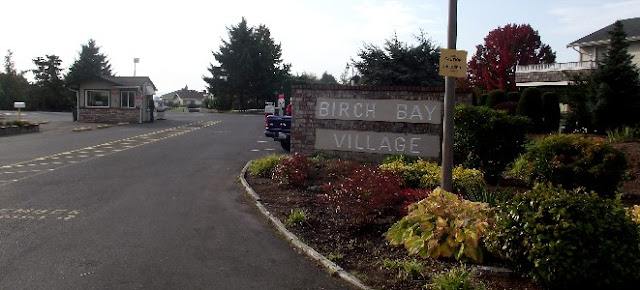Before we went on our extended cruise I had been volunteering with the Whatcom Marine Mammal Stranding Network (WMMSN). I had observed a few seal pups that were thought to possibly need help, retrieved a still-born harbor seal carcass, and helped with the recovery of a dead gray whale. When I got back to Blaine I checked up on the group to see what had happened in my absence. It wasn't long before I got called back into service.
An adult seal or porpoise can be large and heavy so I needed to find someone to help me. All of the usual people were unavailable (including my usual last resort person - Greg) so I called the mother of one of our volunteers hoping that I could convince her to help. Fortunately for me, she gladly agreed.
Greg was not so sure about putting a sea creature in the back of the Subaru and he emptied everything out and gave me a tarp to protect the car.
I met Shirley Sell at Birch Bay Village where we were greeted by Barb, the security guard. Barb confirmed that it wasn't a seal and that it was dead. Barb had done exactly what should have been done upon discovering the animal. She secured the body and took pictures. She gave me several 8x10 photos which were extremely useful.
 |
I had worried about residents disturbing the animal but that wasn't the case. It was the birds. By the time we got there the birds had been at the body and slashed it, making our examination and retrieval more difficult. Fortunately we had the security photos which confirmed that there hadn't been any wounds when landed on the beach.

We donned our gloves and Shirley rinsed the body with seawater prior to our closer inspection.
The porpoise's teeth were very worn down, supporting our initial belief that this was a very old animal that may have died due to natural causes.
Shirley and I struggled to bag the carcass so Barb and two other guards assisted us. There was no way that the two of us could ever have carried it up the steps to the parking lot.
It's better to remove the bagged specimens because people have called the police and reported a dead (human) body on the beach. I couldn't resist telling these guys that this was an abusive husband in the bag - it was the right size and weight.
We managed to get the beast in the truck and were on our way to our storage facility in Bellingham where a chest freezer was waiting for it's new occupant. Our next problem was - who would help us unload this guy?While Shirley drove, I called everyone I could think of, but no luck. Shirley's light bulb came on and she called her daughter (the WMMSN volunteer) who was in a college class in Bellingham. In no time we had her daughter and another student. We snagged another guy at the storage facility, and with the help of a heavy-duty wheel barrow, got our bagged body into the freezer. Hopefully no one saw this and reported a possible murder victim.
Now we are awaiting the necropsy to determine the cause of death. Scientists are not sure why many porpoises are dying but they suspect that high levels of toxins and pollutants impair the immune systems of these and other cetaceans, which makes them more susceptible to life-threatening diseases. Hopefully we will be able to learn something from this one.
After we finished our assignment, Shirley and I were informed that we should have been wearing masks because there is a potentially fatal bacteria that porpoises can transmit to people thru the air. We would have to be alert to any flu-like symptoms over the next 7-10 days. If they developed we would have to rush to the hospital and state that we had had exposure to a porpoise. With this knowledge they would be able to properly threat us and avert another carcass needing to be bagged.
It's been several days and I'm fine so I think we will be okay.
After all this fun and excitement I am finally heading home where much more pleasant things await me.
 |
| Sunset at the Semiahmoo Marina |




